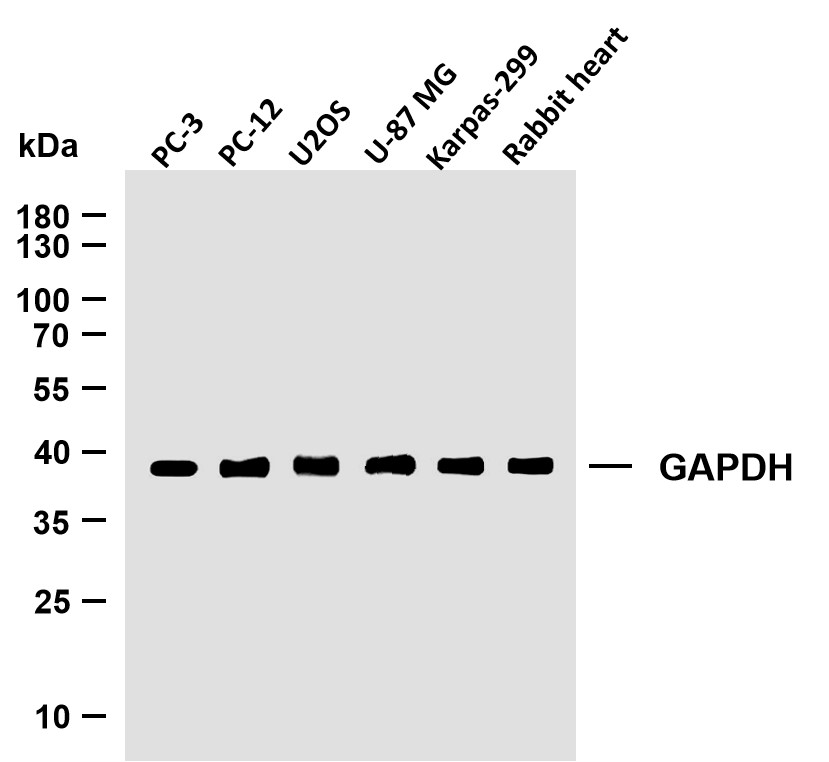
Catalog: YM6890R
Size
Price
Status
Qty.
10mL
$150.00
In stock
0
6mL
$120.00
In stock
0
3mL
$70.00
In stock
0
Add to cart


Collected


Collect
Main Information
Target
MUC4
Host Species
Mouse
Reactivity
Human
Applications
IHC
Conjugate/Modification
Unmodified
Detailed Information
Recommended Dilution Ratio
Ready to use for IHC
Formulation
The prediluted ready-to-use antibody is diluted in phosphate buffer saline containing stabilizing protein and 0.05% Proclin 300
Specificity
The antibody can specifically recognize human MUC4 protein, and has no cross reaction wit MUC2, MUC5AC, MUC6 proteins.
Purification
The antibody was affinity-purified from ascites by affinity-chromatography using specific immunogen.
Storage
2°C to 8°C/1 year,Ship by ice bag
Modification
Unmodified
Clonality
Monoclonal
Clone Number
ABT199
Isotype
IgG2a,Kappa
Related Products
Antigen&Target Information
Immunogen:
Synthesized peptide derived from human MUC4 AA range: 2000-2100
show all
Specificity:
The antibody can specifically recognize human MUC4 protein, and has no cross reaction wit MUC2, MUC5AC, MUC6 proteins.
show all
Gene Name:
MUC4
show all
Protein Name:
MUC4
show all
Other Name:
Mucin-4 ;
MUC-4 ;
Ascites sialoglycoprotein ;
ASGP ;
Pancreatic adenocarcinoma mucin ;
Testis mucin ;
Tracheobronchial mucin ;
[Cleaved into: Mucin-4 alpha chain ;
Ascites sialoglycoprotein 1 ;
ASGP-1 ;
Mucin-4 beta chain ;
Ascites sialoglycoprotein 2 ;
ASGP-2 ;
]
MUC-4 ;
Ascites sialoglycoprotein ;
ASGP ;
Pancreatic adenocarcinoma mucin ;
Testis mucin ;
Tracheobronchial mucin ;
[Cleaved into: Mucin-4 alpha chain ;
Ascites sialoglycoprotein 1 ;
ASGP-1 ;
Mucin-4 beta chain ;
Ascites sialoglycoprotein 2 ;
ASGP-2 ;
]
show all
Background:
The major constituents of mucus, the viscous secretion that covers epithelial surfaces such as those in the trachea, colon, and cervix, are highly glycosylated proteins called mucins. These glycoproteins play important roles in the protection of the epithelial cells and have been implicated in epithelial renewal and differentiation. This gene encodes an integral membrane glycoprotein found on the cell surface, although secreted isoforms may exist. At least two dozen transcript variants of this gene have been found, although for many of them the full-length transcript has not been determined or they are found only in tumor tissues. This gene contains a region in the coding sequence which has a variable number (>100) of 48 nt tandem repeats. [provided by RefSeq, Jul 2008],
show all
Function:
Alternative products:Additional isoforms exist,developmental stage:Expressed early in the primitive gut before respiratory and digestive epithelial cells have acquired their tissue and cell specificity. Expressed at the basal surface of the epithelium from week 14 to 26 weeks and then predominantly localized in only parietal cells. Immediately before birth, found in the cytoplasm of the mucous columnar epithelial cells. In the embryo expressed in skin, then disappears late in gestation.,Function:May play a role in tumor progression. Ability to promote tumor growth may be mainly due to repression of apoptosis as opposed to proliferation. Has anti-adhesive properties. Seems to alter cellular behavior through both anti-adhesive effects on cell-cell and cell-extracellular matrix interactions and in its ability to act as an intramembrane ligand for ERBB2. Plays an important role in cell proliferation and differentiation of epithelial cells by inducing specific phosphorylation of ERBB2. The MUC4-ERBB2 complex causes site-specific phosphorylation of the ERBB2 'Tyr-1248'. In polarized epithelilal cells segragates ERBB2 and other ERBB receptors and prevents ERBB2 from acting as a coreceptor. The interaction with ERBB2 leads to enhanced expression of CDKN1B. The formation of a MUC4-ERBB2-ERBB3-NRG1 complex leads to down-regulation of CDKN1B, resulting in repression of apoptosis and stimulation of proliferation.,miscellaneous:Expression is a very useful predictor of poor prognosis in patients with invasive ductal carcinoma and intrahepatic cholangiocarcinoma, mass forming type (IDC,ICC-MF). Patients with IDC or ICC-MF who have high MUC4 expression had a worse survival rate than those with low MUC4 expression.,PTM:Mucin-4 alpha chain is highly O-glycosylated.,PTM:mucin-4 beta chain is predominantly N-glycosylated.,PTM:Proteolytically cleaved into 2 chains, mucin-4 alpha chain and mucin-4 beta chain.,sequence Caution:May be derived from an intron translation.,similarity:Contains 1 AMOP domain.,similarity:Contains 1 NIDO domain.,similarity:Contains 1 VWFD domain.,similarity:Contains 2 EGF-like domains.,subcellular location:Isoforms lacking the Cys-rich region, EGF-like domains and transmembrane region are secreted. Secretion occurs by splicing or proteolytic processing.,subunit:A heterodimeric complex, composed of a mucin-4 alpha chain and a cysteine-rich transmembrane mucin-4 beta chain. Mucin-4 beta chain interacts with ERBB2 via the EGF-like domain 1. In nonpolarized cells, associates with ERBB2 and ERBB3.,tissue specificity:Expressed in the thymus, thyroid, lung, trachea, esophagus, stomach, small intestine, colon, testis, prostate, ovary, uterus, placenta, and mammary and salivary glands. Expressed in carcinomas arising from some of these epithelia, such as lung cancers, squamous cell carcinomas of the upper aerodigestive tract, mammary carcinomas, biliary tract, colon, and cervix cancers. Minimally or not expressed in the normal pancreas or chronic pancreatitis, but is highly expressed in pancreatic tumors and pancreatic tumor cell lines.,
show all
Cellular Localization:
Cytoplasmic
show all
Reference Citation({{totalcount}})
Catalog: YM6890R
Size
Price
Status
Qty.
10mL
$150.00
In stock
0
6mL
$120.00
In stock
0
3mL
$70.00
In stock
0
Add to cart


Collected


Collect
Recently Viewed Products
Clear allPRODUCTS
CUSTOMIZED
ABOUT US
Toggle night Mode
{{pinfoXq.title || ''}}
Catalog: {{pinfoXq.catalog || ''}}
Filter:
All
{{item.name}}
{{pinfo.title}}
-{{pinfo.catalog}}
Main Information
Target
{{pinfo.target}}
Reactivity
{{pinfo.react}}
Applications
{{pinfo.applicat}}
Conjugate/Modification
{{pinfo.coupling}}/{{pinfo.modific}}
MW (kDa)
{{pinfo.mwcalc}}
Host Species
{{pinfo.hostspec}}
Isotype
{{pinfo.isotype}}
Product {{index}}/{{pcount}}
Prev
Next
{{pvTitle}}
Scroll wheel zooms the picture
{{pvDescr}}



















